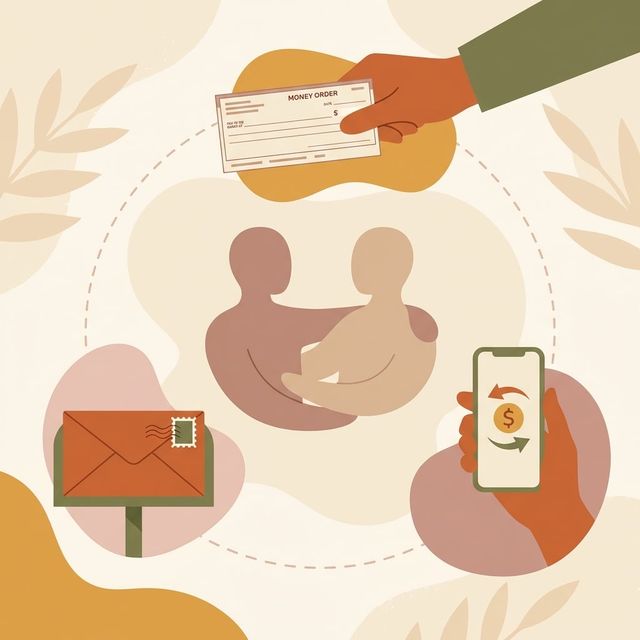Miller County Detention, AR
Explore
Find an Inmate at Miller County Detention, AR
Search for a loved one and send messages and photos in minutes.

Guides for This Facility

Three Ways to Send Money to Someone at Miller County Detention Center
There are three ways to add money to a detainee's account at Miller County Detention Center: drop off a money order at the information desk, mail one in, or deposit funds online through Correct Solutions (CSGpay).
Read Guide
What to Know About Phone Calls from Miller County Detention Center
Phone calls from Miller County Detention Center don't work the way most people expect. Here's how the system works, what to listen for, and what to do if you want calls to stop.
Read Guide
Before You Mail: Complete Checklist for Sending Mail to Miller County Detention
Miller County Detention Facility only accepts personal mail on postcards. Send a letter in an envelope? It'll likely get rejected. Stick with a standard postcard for anything that isn't privileged correspondence.
Read GuideAt a Glance
Communication
- Detainees cannot receive incoming phone calls but may make outgoing collect calls from the housing area.
- The inmate phone carrier is Correct Solutions and the facility lists 1-877-618-3516 as the contact number.
- When receiving an inmate call, the recipient should listen to the entire recorded message before accepting or denying the call.
Mail & Letters
- The facility only allows incoming mail on a postcard except for privileged (legal) correspondence.
- Postcards to detainees must be addressed with the detainee name and the facility address.
- Senders must include a complete return address on outgoing mail to detainees (first and last name and street/city/state/ZIP).
Sending Money
- In-person money orders are accepted at the information desk Monday–Friday from 8:30 a.m. to 4:00 p.m.
- Do not mail cash; you may mail a money order to the Miller County Detention Center's Texarkana address and include the detainee's name.
- Online deposits are available through Correct Solutions at CSGpay.com and the facility provides the vendor's phone contact and service hours.
Facility Info
- Miller County Detention uses Laura’s Card to provide crime victims with rights information and help them make safety decisions.
- The Laura’s Card provided includes links to the Arkansas Crime Information Center, legal aid/protective orders, VINE notification, and the Crime Victim’s Reparation Program.
- Law enforcement must inform victims in writing of their victim’s rights and how to obtain services and orders of protection.
Based on official sources and community feedback. Learn how we verify
Topic Overviews
Communication
Communication at Miller County Detention is mostly initiated by the detainee. You can't call into the jail to reach someone—detainees place outgoing collect calls from the housing area through Correct Solutions (1-877-618-3516). When you receive a call, listen to the full recorded message before accepting or denying it so you catch the caller details and any instructions. Need the calls to stop? Contact Correct Solutions to block your number from a specific detainee or from all detainees. The facility won't deliver messages, so plan on visiting or sending a letter instead. For video, messaging, or other vendor-based services used in Arkansas facilities, you'll typically need to set up an account, keep funds available, and use a compatible device or app.
Read full guideMail & Letters
Mail rules at Miller County Detention are strict. Personal mail is accepted only on postcards—letters and other formats aren't allowed (privileged/legal correspondence is the exception). Address the postcard with the detainee's full name and the facility address, and include a complete return address: your first and last name plus street, city, state, and ZIP. Packages and items from home generally aren't approved. Anything claimed to be needed due to demonstrated hardship requires prior written approval from the Captain or higher authority. Want to send reading material? Softcover books can be delivered only when shipped postage-paid directly from a publisher or bookstore. Hardcover books and magazine subscriptions aren't accepted. Expect staff to screen all incoming mail, with legal mail handled separately from regular correspondence.
Read full guideSending Money
Putting money on a detainee's account at Miller County Detention is straightforward once you know your options. The jail accepts money orders in person at the information desk Monday–Friday from 8:30 a.m. to 4:00 p.m. Make sure the money order shows the detainee's name so it gets credited correctly. You can also mail a money order to the facility's Texarkana address—don't mail cash—and include the detainee's name for proper posting. Prefer to pay electronically? Add funds online through Correct Solutions at CSGpay.com (vendor support hours and a phone contact are available for help). Money on the account can be used for commissary. Orders are placed on Wednesdays and delivered on Fridays.
Read full guideFacility Info
Miller County Detention uses Laura's Card to give crime victims clear, consistent written information about their rights and support safer decision-making after an incident. The card links directly to resources like the Arkansas Crime Information Center, legal aid and protective-order information, VINE notifications, and the Crime Victim's Reparation Program. Arkansas law requires law enforcement to provide victims with their rights in writing, along with information on obtaining services and orders of protection. Officers must also tell victims about available medical, housing, counseling, financial, social, legal, and emergency services. As part of Arkansas's local corrections system, Miller County Detention follows standard county-jail intake and classification practices.
Common Questions
Showing 6 of 12Can I call an inmate at Miller County Detention Center?
No. Detainees at Miller County Detention cannot receive incoming phone calls, but they can place outgoing collect calls from the housing area through the facility’s phone vendor.
CommunicationWho provides inmate phone service at Miller County and how can I contact them?
Correct Solutions provides the inmate phone service. You can contact Correct Solutions at 1-877-618-3516 for account help or to request number blocking.
CommunicationWill the jail deliver a message to a detainee for me?
No. Miller County Detention does not deliver messages for detainees. If you need to communicate something, plan for a visit or send a letter instead.
CommunicationWhat kind of mail can I send to someone at Miller County Detention?
Miller County Detention accepts incoming personal mail only on postcards. Other personal mail formats aren’t permitted, except for privileged legal correspondence, which is handled differently than non-legal mail.
Mail & LettersHow should I address a postcard to a detainee at Miller County Detention?
Put the detainee’s full name and the facility address on the postcard. You also need a complete return address: your first and last name, street, city, state, and ZIP.
Mail & LettersCan I send books, magazines, or packages to Miller County Detention?
Packages are generally not approved, and any item claimed to be needed due to demonstrated hardship must be pre-approved in writing by the Captain or higher authority. Softcover books are allowed only if shipped postage-paid directly from a publisher or bookstore; hardcover books and magazine subscriptions aren’t accepted.
Mail & LettersMore Guides
Ready to Connect?
Search for your loved one to start communicating today
Did You Know?
If you need to add funds, bring a money order to the facility’s information desk in person Monday–Friday between 8:30 a.m. and 4:00 p.m. Make sure the detainee’s name is clearly written on the money order so the funds are applied correctly.
This guide is compiled from official facility documentation and community feedback. Learn how we verify
